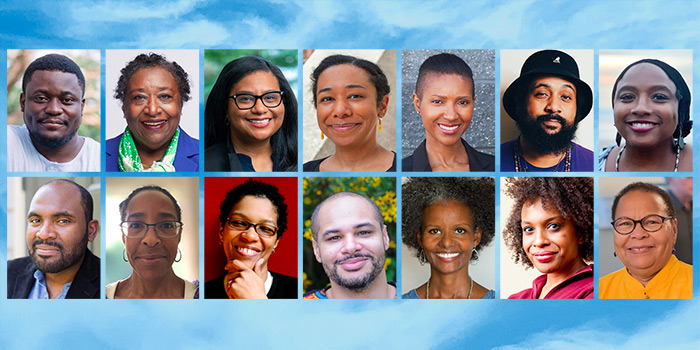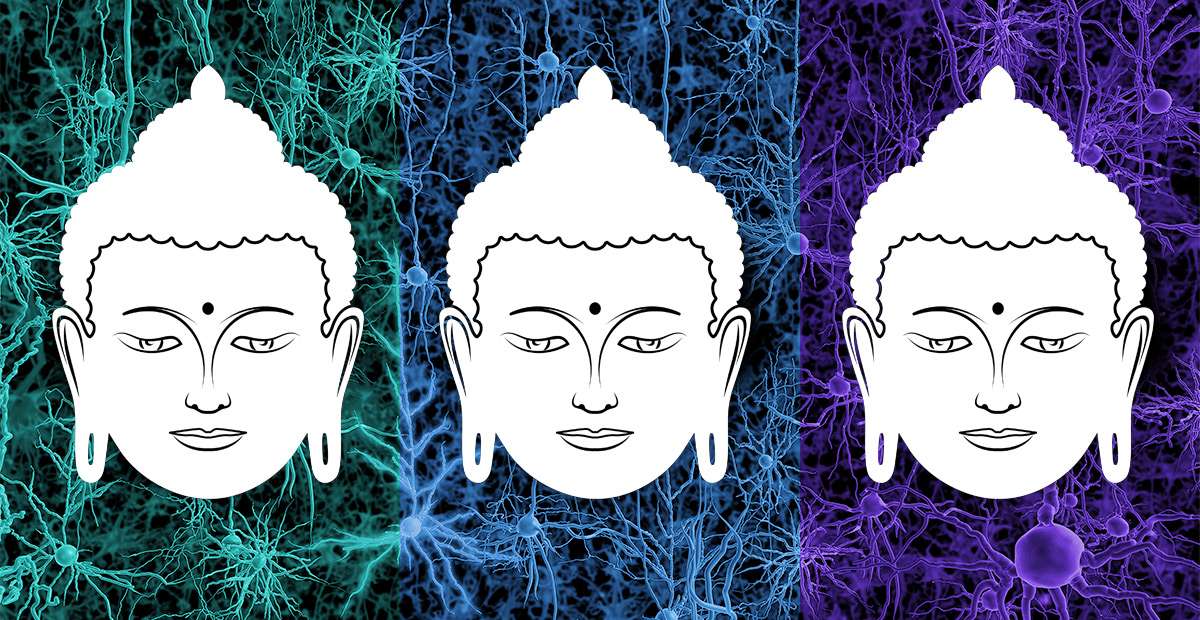by Nalanda Institute
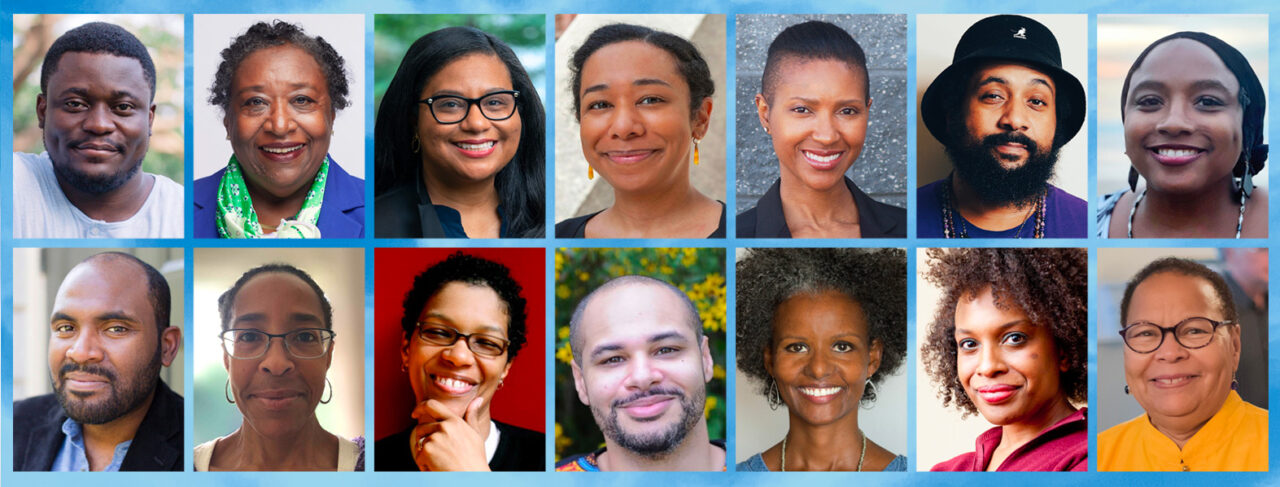
This Black History Month, we invite you to join us in celebrating the many Black teachers whose voices uplift our community!
At a time when our collective movement towards a global future of inclusive belonging is facing serious setbacks, it is more essential now than ever that we honor Black History Month. This time of remembrance offers us all a vital invitation to understand the real history of humanity and the societies we live in, as well as a precious opportunity to acknowledge and celebrate the contributions our Black teachers at Nalanda Institute have made to our community and the world we share.
Each of these brilliant and beloved teachers, in their own way, is deepening and expanding on the history of radical thinking, compassionate wisdom, and joyfully just activism embodied by American Black leaders like Harriet Jacobs, Dr. Martin Luther King Jr., James Baldwin, bell hooks and Audre Lord; as well as by Caribbean and West African leaders within the Ifa lineage of the Yoruba people.
Whether or not you’ve had the benefit of studying directly with one or all of these teachers, we invite you to take a moment to further explore their impactful voices and generative work weaving the dharma into liberation teachings for all today, using the links below.
May all beings be cherished, joyful, and free!
by Nalanda Institute
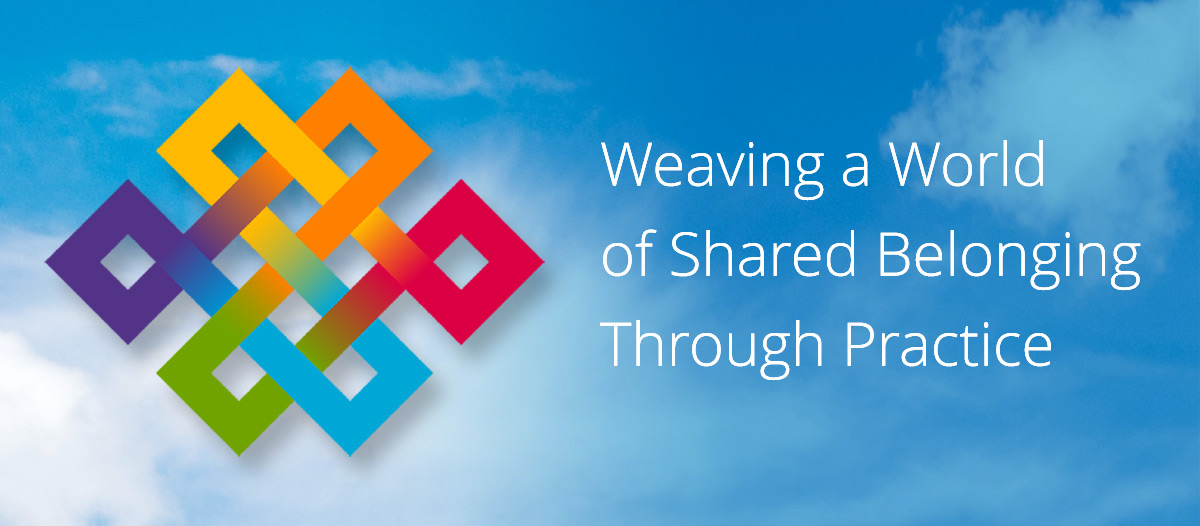
As we move through our Year-End Drive, we will release four practices that support us in collaboratively Weaving a World of Shared Belonging. Drawn from the transformative wisdom and arts of the Nalanda tradition and aimed at realizing the vision of the Clockwork Tantra (Kalachakra), these practices guide us through four key steps to Weaving a World of Shared Belonging:
- Loving all beings equally as oneself
- Disidentifying with our traumatic sense of being a separate self
- Developing and extending unconditional love to all beings
- Identifying with our altruistic spirit to help awaken all beings
We hope you’ll join us in these practices as we collectively work towards dismantling suffering and reknitting together a fabric of connection across this world!
Practice 1: Equal Empathy
Practice unlearning implicit bias to expose and break through othering biases embedded in your personal and collective unconscious so you can see and love all living beings, close, neutral, and far, as equally dear as your loved ones and yourself. Nalanda Institute founder Joe Loizzo guides us through this meditation.
Practice 2: Four Keys Self-Analysis
Try this practice of self-analysis with Joe Loizzo through the four keys to release the traumatic identity habits that anchor our false sense of separateness and to reclaim our true self of radical openness that
connects us to the real world of our shared belonging.
Practice 3: Compassion Chain Reaction
Try this brief practice of wise give-and-take that slowly grows your capacity to extend threads of loving-caring awareness openly in a compassion chain reaction that gradually reaches out to embrace all beings everywhere.
Practice 4: Becoming the Clockwork
Try this brief practice of role-modeling imagery, imagining the fabric of your mind-body process as a loom on which to weave the Clockwork vision of Mother Space and Father Time which guides us all towards the Kalachakra apocalypse of global shared belonging and restoring our earth as a medicine planet.
Our Year-End Fundraising Drive supports our healing work Weaving a World of Shared Belonging. We come together through our core programs, retreats, short courses, free affinity groups, and donation-based lunchtime meditations to restore and deepen connection to ourselves, each other, our whole human community, and to our living planet. If you believe in the transformative work at Nalanda Institute, we invite you to donate today.
by Joe Loizzo

Over the days since the U.S. election, I’ve heard from many in our community here and around the world who, like me, feel deeply disappointed and troubled by the outcome. While some of you have shared fears for your safety and/or the safety of your family, friends, and the world we share, others have expressed a deep sense of helplessness and despair for our collective future.
There is no minimizing the potential harm that may come to vulnerable individuals and groups in this country and abroad from the oppressive policies of the next administration, or the extent to which their bullying rhetoric and insidious lies can provoke an even greater spike in hate speech and hate crimes than we have witnessed over the past eight years. I hope you all are seeking out and getting the support you need to feel safe and connected through this difficult time, finding people with whom you can share your thoughts and feelings in a spirit of empathy and solidarity, and even finding the presence of mind to turn towards the healing, contemplative insights, and practices that bring us all together at Nalanda Institute.
Given how stressful and disorienting so many find this outcome, I wanted to share some of the reflections and practices I’ve leaned on to help me navigate this event and others like it. First of all, when an outcome as charged and historic as this election takes place, it may strike us as shocking, as if it came out of the blue; it may prompt us to project our worst fears about the adverse impacts it may have down the road; it may even lead us to feel discouraged, helpless and powerless in the face of a volatile world. When I notice any of these mindsets arising, I try to bring my mind back to settle in the present moment by practicing equanimity and self-analysis (see links below) and redirect my attention to examining any deep-seated biases and reactivities that may be troubling my own mind and/or the minds of others. When my mind begins to clear and my heart open, I try my best to trace the tangled network of causes and conditions that have manifested the current state of affairs to help me hold and understand it with enough care to respond skillfully to the challenges it poses in my own life, the lives of those around me, and the world we share.
While pundits of every stripe are working overtime to make sense of Trump’s victory, attributing it to a groundswell of economic populism, to the insidious poisons of racism and sexism in the nation’s history, or to mistakes made by Harris and her campaign, the Buddha-dharma takes a very long view and a developmental perspective on our collective future. It teaches us that charged public events like these reflect the complex interplay of current social challenges with intergenerational traumas and self-protective instincts at work deep within our personal and collective unconscious minds. So, the path to bringing equanimity and wise compassion to these challenges, traumas, and instincts can only begin with each of us working towards greater clarity in our own hearts, minds, relationships, and lives.
What does this outcome mean for me and the communities I belong to/connect with? What does it touch in the depths of my/our embodied psyche, and why? What might it mean for those who hold a very different perspective, and what might it reflect in their own lived experience and ancestral trauma? What can I do to protect myself, my friends, and neighbors and to work with friends and allies towards the kind of world we want to create and inhabit together?
Within the Nalanda tradition, such investigation and analysis is an indispensable, ongoing part of the deeper understanding and wise care we all need to adapt and thrive as individuals and as a diverse community in a complex world. Yet investigation and analysis are not intrinsically helpful or freeing; they can also reinforce our confusion and compound our suffering. How do we know if our inquiry is leading us forward towards genuine healing and freedom or reinforcing the archaic instincts and habits that keep us locked in the past? As you might expect, the tradition not only provides guidance and methods, but also offers touchstones for checking our movement on the path.
First of all, it encourages us to check whether our inquiry into our own minds and actions or those of others is driven by binary thinking, blame, and fear or is emerging organically from a sense of acceptance, receptivity, empathy, and care? If the former, we may need to pause our inquiry, put on our own oxygen mask, and wait for a deeper shift in our inner state. On the other hand, if our inquiry starts well and arrives at some closure, we can also check our findings by asking whether they leave us with a net gain in equanimity, receptivity, and care or feeling more upset, contracted, and/or intolerant. Here, too, if we feel the latter, we may want to double-check our findings by facing and caring for the upset they stir, and then seeing if we can hold them differently with a larger, more healing perspective.
Another key guidepost for our reflections relates to the collective nature of the event and forces we’re facing. Within the basic logic of Buddhist social psychology and political theory, the root of our suffering, individually and collectively, is our self-protective, self-enclosing instinct to sense ourselves as not just distinct but fundamentally separate from others and the world we share. So if our reflection and processing is coming from and/or reinforcing a sense of separation rather than connection and shared belonging—of us-vs-them rather than we’re all in this together—then we will want to look deeper to face and embrace parts of us that may be feeling unsafe, alone, or unseen.
Of course, this is not to bypass the real threats or harms we’ve experienced or actually face, but rather to ground our inquiry in our basic trust in ourselves, our humanity and potential, our communities and guides, so that we can understand more fully and engage more skillfully with whatever differences or challenges we face in the world.
It should be clear from these general comments that the dharmic approach to social and political life is radically counter the logic of bipartisan politics and the binary structures of racial, gender, and economic division baked into the dominant culture of the U.S. I believe the countercultural stance of the dharma is precisely the medicine we need, individually and collectively, to move beyond the toxic culture on which this nation was founded, a culture based on the separatist logic behind white supremacy, patriarchy, and extreme capitalism. It offers us a powerful antidote to the othering biases embedded in our individual and collective unconscious, and a clear way through the state of division, inequity, and alienation that dominant culture has wrought towards the shared belonging and flourishing we all long for, need, and deserve.
In this, the visionary counterculture of Buddhism is deeply resonant with the counterculture that has gradually helped this nation move towards its full potential: the progressive movement for full equality and real social justice. This egalitarian populist movement has countered the dominant culture of the U.S. throughout its history, starting with the abolitionism that fueled the Civil War and the womens’ suffrage movement following it, continuing through the civil rights movement of the 1960’s and the second-wave feminist movement of the 1960’s and 70’s, and culminating more recently in the #MeToo movement of the early 2000’s and the Black Lives Matter movement after the murder of George Floyd in 2020.
While cultures feel bigger than all of us and set in stone, the fact is that they are very human, constantly changing collective constructions. Like a kind of living software embodied in our caregivers, teachers, mentors, friends, and neighbors, they are imprinted into our conscious and unconscious embodied minds in the course of our early development and adult socialization, albeit in different ways based on our social location. The good news is that the dominant culture only lives and breathes within our own socially conditioned body-minds, the body-minds of our fellow Americans, and the institutions we collectively inherited and maintain. Here is where the contemplative insights and practices of the Nalanda tradition offer a potent complement to our nation’s progressive movement that can help us dismantle the dominant culture’s toxic code within and around us and help clear a way forward for us to rewrite our future as individuals and a community.
This is why, as I continue to share my shock, grief, and deep concern about where we are as a nation today, the greatest source of direction, meaning, and purpose I can imagine to help us move through and past this point is to do what Kamala Harris urged us to do in her concession speech: roll up our sleeves and get more invested than ever in cutting the roots of the toxic culture poisoning our political life, institutions, and nation. Of course, working at the root cause of what ails us all in this way is deeply sobering and must give us pause. It commits us to a lifetime and generations of working painstakingly together towards freedom and radical transformation.
At the same time, working at the root empowers us to keep coming back to our full capacity for greater clarity, resilience, and skill, helping us stay awake to real and present dangers and opportunities while also enabling us to engage more effectively and consistently with them as they arise. In particular, it can help open us to engage and support those friends, neighbors, and communities in the cross-hares of this latest backlash of the nation’s dominant culture of violence, oppression, and hate: especially the BIPOC community, the LGBTQ+ community and women of all backgrounds.
By investing in the practices of equanimity, self-analysis, and wise compassion, we can simultaneously support a long and a short game that can keep us from getting thrown off balance, even by such major setbacks, and keep us persistently moving forward as Kamala urged us, towards a world of shared belonging and global flourishing.
I leave you with my favorite passage from one of the most inspiring and beloved of Mahayana Scriptures—a sutra on the lifelong, intergenerational work of psychosocial healing, liberation, and change—The Holy Teaching of Vimalakirti. A passage I often return to when I can’t find the space to see a way forward, it describes a dialogue the Buddha had with a group of bodhisattva altruists seeking to envision and co-create a society whose citizens learn to break free of their toxic conditioning and develop a buddha’s wisdom and spiritual faculties, a society called “a buddha field.” The passage recounts a dialogue in which Shakyamuni reminds one of their number that our most creative work to change our world begins by engaging the boundless space of our shared human potential and its infinite possibilities:
Then the young Licchavi Ratnakara…asked, “What is the bodhisattvas purification of the buddha field?”…The Buddha said, “A buddha field of bodhisattvas is a field of living beings…A bodhisattva embraces a buddha-field to the same extent that he causes the development of living beings….to the extent that living beings are introduced to the buddha-gnosis…to the extent that living beings increase their holy spiritual faculties. For example, Ratnakara, should a bodhisattva, who knows full well that all things are like empty space, wish to build a buddha field in order to develop living beings, he might go ahead, in spite of the fact that it is not possible to build or to adorn a buddha-field in empty space.”
This powerful image of how we—as individuals and a community—can use the wisdom of emptiness to clear our hearts and minds of the biases and toxic emotions that lock us into cultures of domination and to envision and co-create within that space of human potential a beloved community that frees and connects us all, has always given me a sense of resilience and perseverance at times like these when all hope seems lost.
As liberating as this hopeful vision may be, the second key teaching from Vimalakirti brings the lived experience of the bodhisattvas’ work down to earth and closer to home. That is the teaching that being engaged in the collective life of a society or polity from a place of unconditional wisdom and compassion isn’t all space and light, but typically feels like a vicarious sickness in which we feel and sense in our own hearts, bodies and minds the burden of confusion and suffering binding all the beings around us. This is what Vimalakirti calls “the sickness of the bodhisattva” or “the sickness of great compassion.” Listen to this passage in which the bodhisattva of wisdom, Manjushri, visits the lay-activist Buddha Vimalakirti and learns that he is not sick in any ordinary sense but with the vicarious burden of feeling and holding the suffering of his community:
Manjushri declared…Householder, whence came this sickness of yours? How long will it continue? How does it stand? How can it be alleviated?”Vimalakirti replied, “Manjushri, my sickness comes from ignorance and the thirst for existence and it will last as long as do the sicknesses of all living beings. Were all living beings to be free from sickness, I also would not be sick. Why? Manjushri, for the bodhisattva, the world consists only of living beings, and sickness is inherent in living in the world. Were all living beings free of sickness, the bodhisattva also would be free of sickness. For example, Manjushri, when the only son of a merchant is sick, both his parents become sick on account of the sickness of their son. And the parents will suffer as long as that only son does not recover from his sickness. Just so, Manjushri, the bodhisattva loves all living beings as if each were his only child. He becomes sick when they are sick and is cured when they are cured. You ask me, Manjushri, whence comes my sickness; the sicknesses of the bodhisattvas arise from great compassion.
So the bottom line of Vimalakirti’s profound wisdom teaching is that we need to practice working at holding the cognitive dissonance between two seemingly contradictory realities: the reality of the boundless potential of human individuals and societies for awakening and liberation; and the reality of how painfully limited real individuals and communities are right now given their conditioning in the toxic delusions of separation and the afflictions of fear and hate. The work of holding that cognitive dissonance is where the rubber of the bodhisattvas’ way of life meets the road. It is the profound practice Vimalakirti calls “the tolerance of the ultimate ungraspability of all things” (anupalabdha-dharma-ksanti).
If and when you feel ready to turn to the practice of the bodhisattvas’ purification of the buddha field, here is a list of next steps I suggest:
- Try this equanimity meditation to settle, center, and clear your heart and mind
- Try this equal empathy practice to expose and work through your dominant cultural biases about the diverse people in our lives and world
- Try this practice of self-analysis through the four keys to expose and dismantle the familial-social identity habits that anchor your dominant cultural biases
- Try this ocean of loving kindness practice from Rahshaana Green, inspired by Rhondha Magee, to awaken the altruist’s spirit of love and compassion for all beings
- Attend one of our racial/gender affinity groups to get support understanding and undoing your racist/patriarchal/dominant cultural conditioning.
- Read some of the writings of Buddhist critics of our dominant culture like bell hooks’ All About Love: New Visions, Killing Rage: Ending Racism, The Will to Change: Men, Masculinity, and Love, and/or Where We Stand: Class Matters.
*New resources as of December 5th, 2024:
- Try this brief practice of the compassion chain reaction to stretch your capacity to extend threads of loving-caring awareness openly out to all beings everywhere
- Try this audio meditation on the Clockwork vision of world transformation, based on the Kalachakra prophecy for the future of our human community and our planet earth
by Joe Loizzo

Dear Friends,
As we brace to hear the results of a hotly contested, deeply consequential election, we have an opportunity to strengthen one of the most protective and beneficial muscles in our embodied minds: equanimity.
While the survival drive that anchors our traumatic way of being is rooted in our instincts for self-
enclosure, separation, and duality—self or other, life or death, good or bad—the thriving mode that frees us to open our hearts and minds and to engage the full complexity of our lives and world, is rooted in the soil of our connective social capacities for love, compassion, gratitude, and equanimity.
Equanimity holds the wisdom of connection—the wisdom that helps expose and release the deathgrip of self-protective instincts, self-enclosing identities, and rigid worldviews by keeping us open to others and their unique needs, lived identities, and distinctive worldviews. It reminds us that holding any fixed, binary position fuels opposition, that fixated attachment to any binary outcome locks us into a rigid mindset and way of being prey to what are called the Eight Worldly Winds: clinging to comfort and fighting discomfort; attachment to winning and aversion to losing; seeking praise and rejecting criticism; clinging to celebrity and avoiding censure. In the Mahayana tradition, the social scope of the worldly winds is emphasized: clinging to good things for our loved ones and in-group while wishing the opposite for our challengers or out-group. Equanimity is the medicine that allows us to move through these winds without being thrown off center and off balance—to be open, resilient, flexible, and responsive enough to stay connected to all beings and to the infinite complexity of things in a continuous, unwavering way.
Editor’s note:
May this meditation support all beings everywhere in the pursuit of their ongoing practice of equanimity while being fully present to the complexity within ourselves, within those around us, and the world we collectively share.
by Joe Loizzo
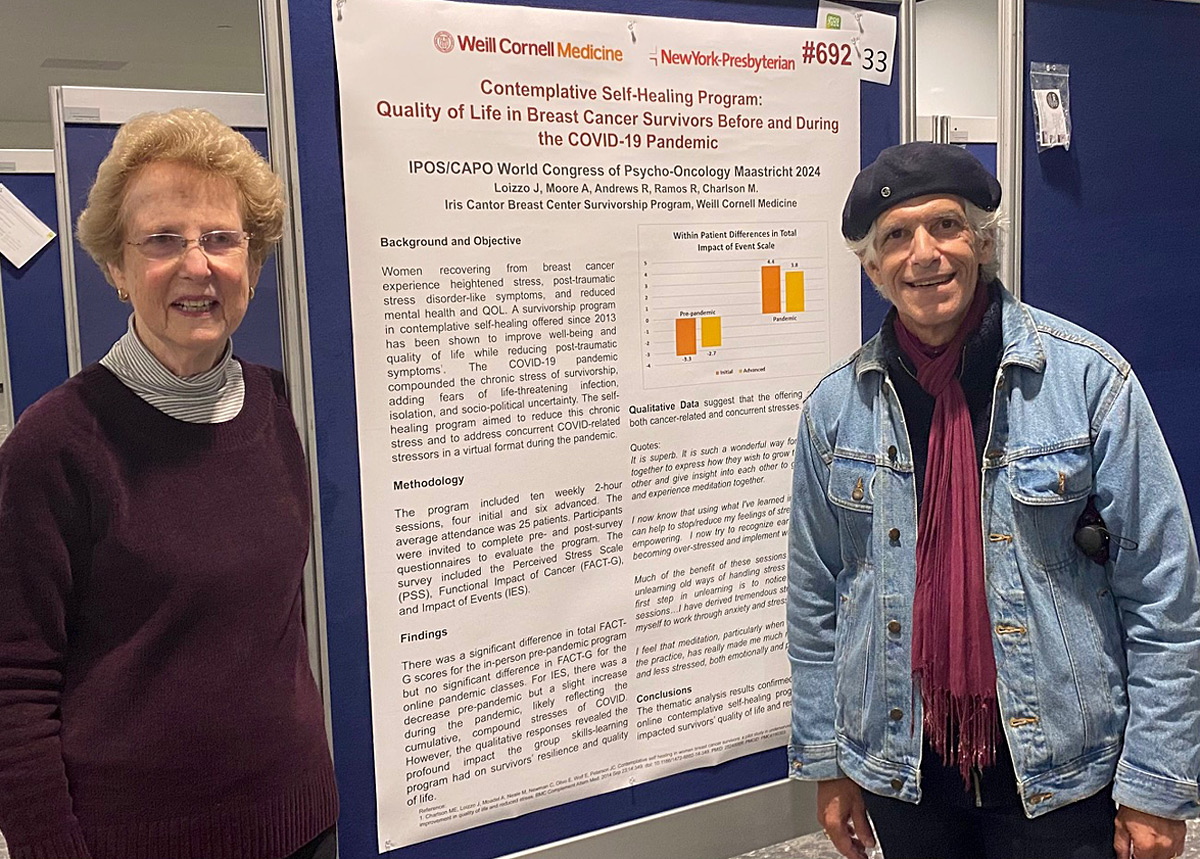
For the last twenty years, it has been a privilege and a joy to lead a Program in Contemplative Self-Healing for breast cancer survivors at Weill Cornell Medical College in New York City. Despite dramatic gains in cancer care, most of these women struggle with post-traumatic stress syndrome after their treatment. This syndrome has long gone unnoticed and unaddressed by conventional oncology and makes their recovery far more challenging than it needs to be. In these groups, 25–35 women who have completed treatment learn and share together in an open healing community how mindfulness, compassion, imagery, and breath practices help them navigate the vital transition from simply surviving their cancer to thriving at a new level of well-being. It has been a transformative experience for me to be facilitating these groups of incredible women over the years, tasting the healing alchemy that takes place between them, and witnessing how some graduates have returned year after year to welcome anxious newcomers into their open and uplifting contemplative community.
This fall brought another opportunity for my research partner at Weill Cornell, leading oncologist Dr. Anne Moore and I to share the latest findings of the program with fellow cancer researchers from around the world. The conference, held in the charming Dutch city of Maastricht, was hosted by the International Psycho-Oncology Society, a unique organization that brings together mental health professionals and oncologists to go beyond simply treating cancer to improving the overall health, quality of life and well-being of the people living with and/or recovering from it. While the dedicated researchers and clinicians we met made the conference truly inspiring, it was sobering for us to confront once again how very far behind our U.S. medical system is in recognizing and seriously addressing this vital need.
Our poster presentation reviewed the research Dr. Moore and I have been doing over the years at the Breast Cancer Survivorship Program at the Iris Cantor Women’s Center at the Weill Cornell Medical College along with the rest of our team, Nalanda Institute board member Dr. Mary Charlson, Rosio Ramos, and Dr. Robin Andrews of the Weill Cornell Division of Epidemiology. The ten-week Contemplative Self-Healing Program based on the Compassion-Based Resilience Training (CBRT) I developed over 25 years ago at Columbia Presbyterian Hospital, has been found in multiple pilot studies conducted at Weill Cornell and Montefiore Einstein as of 2003 (see Editor’s Note below to read the pilot studies), to significantly improve the quality of life and reduce the post-traumatic stress symptoms of women recovering from breast cancer.
Our poster presentation also distilled the latest article to come out of our teamwork, showing that the program initially offered in person at Cornell has been effectively delivered online, co-hosted by Nalanda Institute, since the COVID 19 pandemic in 2020. The poster itself features some of the inspiring quotes of program participants, drawn from the qualitative analysis of their unstructured comments done by Dr. Andrews. Here are just a few of the comments participants shared about their experience in the program, which we included in the poster:
“It is superb. It is such a wonderful way for people to be together to express how they wish to grow to comfort each other and give insight into each other to gain knowledge and experience meditation together.”
“I now know that using what I’ve learned in the program, I can help to stop/reduce my feelings of stress. That is very empowering. I now try to recognize early on when I am becoming over-stressed and implement what I’ve learned.”
“Much of the benefit of these sessions has been about unlearning old ways of handling stress and anxiety. The first step in unlearning is to notice. Through these sessions…I have derived tremendous strength and faith in myself (and my ability) to work through anxiety and stress.”
“I feel that meditation, particularly when I have maintained the practice, has really made me much more self-reflective and less stressed, both emotionally and physically.”
My heartfelt thanks to Drs. Moore and Charlson for having the fierce compassion to champion and support this much-needed work for the last twenty years, and of course, to the hundreds of wise and brave women who have allowed me to accompany them on their journey to full recovery and greater well-being.
Editor’s Note:
If you’re interested in learning more and/or participating in this program, reach out to Rosio Ramos
Learn more about Weill Cornell’s Breast Center Survivorship Program
Check out the poster presented at the conference
Learn more about Nalanda Institute’s Compassion-Based Resilience Training (CBRT), upon which the Contemplative Self-Healing Program conducted at the Iris Cantor Breast Cancer Center Survivorship Program is based on, or about Nalanda Institute’s CBRT Teacher Training.
by Nalanda Institute
“The Dalai Lama calls karma ‘self-creation’, because in every single second, what I do, think or say, is the process of producing the person I become.”
— Venerable Robina Courtin
The Buddha described wisdom and compassion as being the two wings of the bird of awakening. We need wisdom to understand the workings of our own mind and to discern between skillful and unskillful thoughts. We need compassion to transform our discerning thoughts into generative action motivated by the desire to alleviate our own suffering and the suffering of others.
This Fall, our Certificate Program in Wise Compassion begins, where we look at how to develop these two great wings of awakening. If you’re curious about the program, we invite you to preview this lecture which is a part of our Wise Compassion curriculum. Within this lecture, Venerable Robina Courtin—a Buddhist nun and touring teacher of Buddhism, who over the years, has also served as editorial director of Wisdom Publications, editor of Mandala magazine, executive director of Liberation Prison Project—discusses these two wings of awakening, explores the meaning of each and shares how they relate to each other on an individual and collective level.
Venerable Robina Courtin discusses how wisdom supports us in developing ourselves to be a “suitable vessel” to embody the Bodhisattva path of compassion. She provides a framework to understand how compassion arises out of wisdom, and within this framework, she also touches on the concept of karma, the importance of self-love, the three poisons, Buddhist psychology versus Western psychology, and the Buddhist perspective on compassion fatigue. Venerable Robina Courtin creates a space for us to consider what our relationship is like with ourselves (wisdom), what our relationship is like with others (compassion), and how these two wings support our bird of awakening to take flight.
We hope you enjoy these reflections and that they provide insight and understanding into these two foundational Buddhist principles, as well as provide a window of understanding into the teaching style, content, and discussions held within our Certificate Program in Wise Compassion.
Learn more about our Certificate Programs being offered this Fall 2024:
Certificate Program in Wise Compassion
Certificate Program in Embodied Wisdom
Programa de Certificación en Sabiduría Encarnada
Programa de Certificação em Sabedoria Corporificada
Contemplative Psychotherapy Program Overview
by Nalanda Institute
If you’re curious to learn more about the types of conversations we’re holding within our Certificate Programs, check out this lecture from our Certificate Program in Embodied Wisdom where Thanissara discusses the feminine as essential to our awakening. Thanissara, MA in Mindfulness-Based Psychotherapy, is a Climate Activist, author, co-founder of Dharmagiri Sacred Mountain Retreat, Buddhist teacher, and visiting faculty of our Certificate Program in Embodied Wisdom.
This video is a snapshot of a class in progress, where Thanissara applies the Dharma to our times of planetary emergency. She comments on what has led to our current collective consciousness, which she describes as being divorced from a deep sense of belonging. Thanissara invites us to look more deeply into our understanding of the world, and reflect on the internal and external narratives that define who we are both individually and collectively. She discusses how the dharma has the capacity to illuminate the potential of the medicine of awareness, investigation, inquiry and freedom, to explore and make conscious choices. Thanissara also dives into the importance of reclaiming the feminine in support of our liberation. She describes the feminine as a nondualistic, formless, intuitive awareness which allows us to move beyond the cognitive into a place of embodied feeling. This place of embodied feeling takes us away from an objectification of the other, and toward a stance of interconnection—which is critical at this planetary moment in time.
Our Certificate Program in Embodied Wisdom starts this Fall 2024! Learn more + apply now.
Learn more about our other Certificate Programs starting Fall 2024:
Certificate Program in Wise Compassion
Programa de Certificación en Sabiduría Encarnada
Programa de Certificação em Sabedoria Corporificada
Learn more about our Contemplative Psychotherapy Program:
Contemplative Psychotherapy Program Overview
by Nalanda Institute
Nalanda Institute’s Certificate Program in Embodied Wisdom brings together the embodied transformational psychology of the Tibetan Tantras with current neuropsychology, psychotherapy, and psychosocial change to bring a holistic approach to healing trauma and fostering personal and communal well-being. Curious to learn more?
Check out this short video, where Chantelle Brown, MSW, LMSW, and Co-Director of our Certificate Program in Embodied Wisdom, shares her perspective on what this program offers participants and how it impacts our individual and collective awakening. Chantelle discusses how the program offers a pathway to navigate this time of immense global change, while also inviting us to discover “who we are” within our current modern-day context. Chantelle explores how our lineages (including experiences of colonization, immigration, and migration) affect our identities and how we must make loving contact with our unique lived experiences and narratives before we can move toward true liberation.
The Certificate Program in Embodied Wisdom offers a space to come into conversation with our personal stories and identities framed within the social and cultural contexts that affect us individually and collectively.
Learn more about our Certificate Program in Embodied Wisdom
Learn more about our other Certificate Programs being offered in Fall 2024:
Certificate Program in Wise Compassion
Programa de Certificación en Sabiduría Encarnada
Programa de Certificação em Sabedoria Corporificada
Contemplative Psychotherapy Program Overview
by Nalanda Institute

Summertime offers us longer days, warm breezes, and a natural invitation for more play, a slower pace, and joyful activities. It’s a magical time when lush foliage and blooming flowers invite us to depart from our regular routines and create new rituals that evoke a sense of expansion and connection.
Our Summer Reading List, an annual Nalanda Institute tradition, is a compilation of book recommendations thoughtfully shared by members of the Nalanda Institute community. The intention of this list is to help support a sense of wonder, ease, and connection through the joy of reading. We have some great recommendations that will no doubt spawn introspection, wisdom, practice, healing, embodied awareness, contemplation, activism, and awe!
We hope you find a book or two that can accompany you over the next few months. Happy Summer!
We are an affiliate of Bookshop.org and will earn a small commission if you click through and make a purchase.
by Nalanda Institute
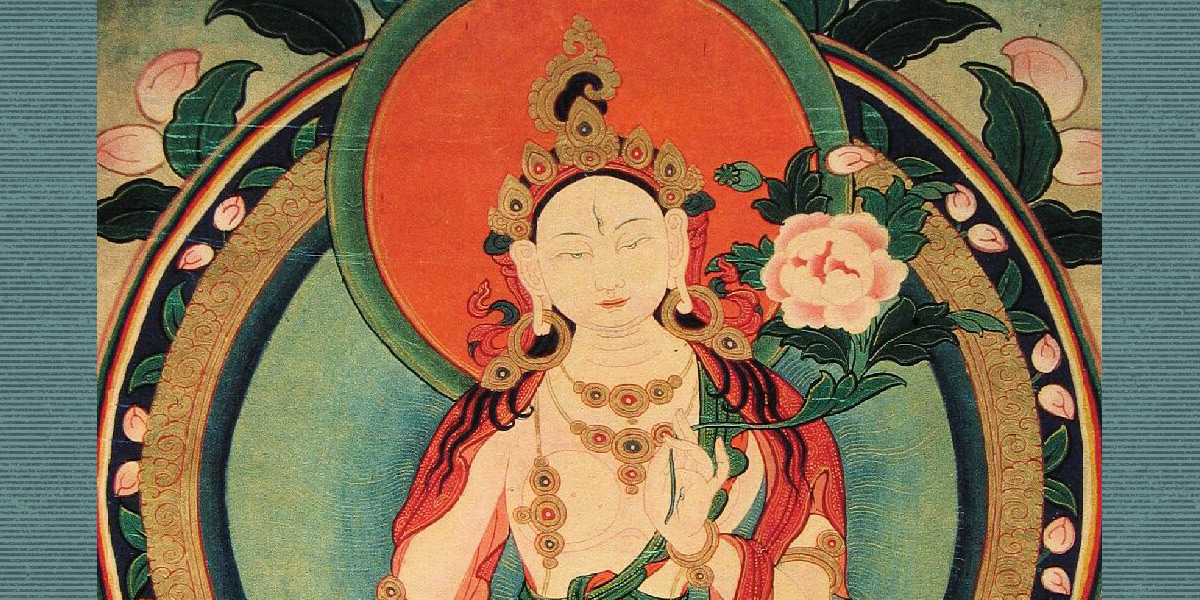
This meditation is from our Fall 2023 Certificate Course in Wise Compassion, led by Pilar Jennings, PhD, author, psychoanalyst and one of Nalanda Institute’s core teaching faculty across our Certificate Courses within our Contemplative Psychotherapy Program—including our Fall 2024 Certificate Course offerings.
In this meditation, Pilar offers guidance on how to settle into the body and lean into the practice of becoming more attuned to and aware of our own suffering, as well as the suffering of others. Pilar then invites us to apply tenderness to the suffering. Both meditating on awareness, and cultivating tenderness, can help us to lay the foundation for personal and social healing.
Enjoy!
En este audio, Pilar Jennings nos ofrece orientación sobre cómo asentarnos en el cuerpo y dedicarnos a la práctica de estar más en sintonía y ser más conscientes de nuestro propio sufrimiento, así como del sufrimiento de los demás. A continuación, aplicamos ternura. Meditar sobre la conciencia y cultivar la ternura puede ayudarnos a sentar las bases de una curación personal y social.
Meditación traducida por C. Gutiérrez
Neste áudio, Pilar Jennings oferece orientação sobre como se acomodar no corpo e se dedicar à prática de nos tornarmos mais sintonizados e conscientes de nosso próprio sofrimento, bem como do sofrimento dos outros. Em seguida, aplicamos ternura. Meditar sobre a consciência e cultivar a ternura pode nos ajudar a estabelecer as bases para a cura pessoal e social!
Meditação traduzida por I. Zenteno
Find out more about Nalanda Institute’s Contemplative Psychotherapy Certificate Courses starting Fall 2024:
Contemplative Psychotherapy Program Overview
Certificate Program in Wise Compassion
Certificate Program in Embodied Wisdom
Programa de Certificación en Sabiduría Encarnada
Programa de Certificação em Sabedoria Corporificada
by Nalanda Institute
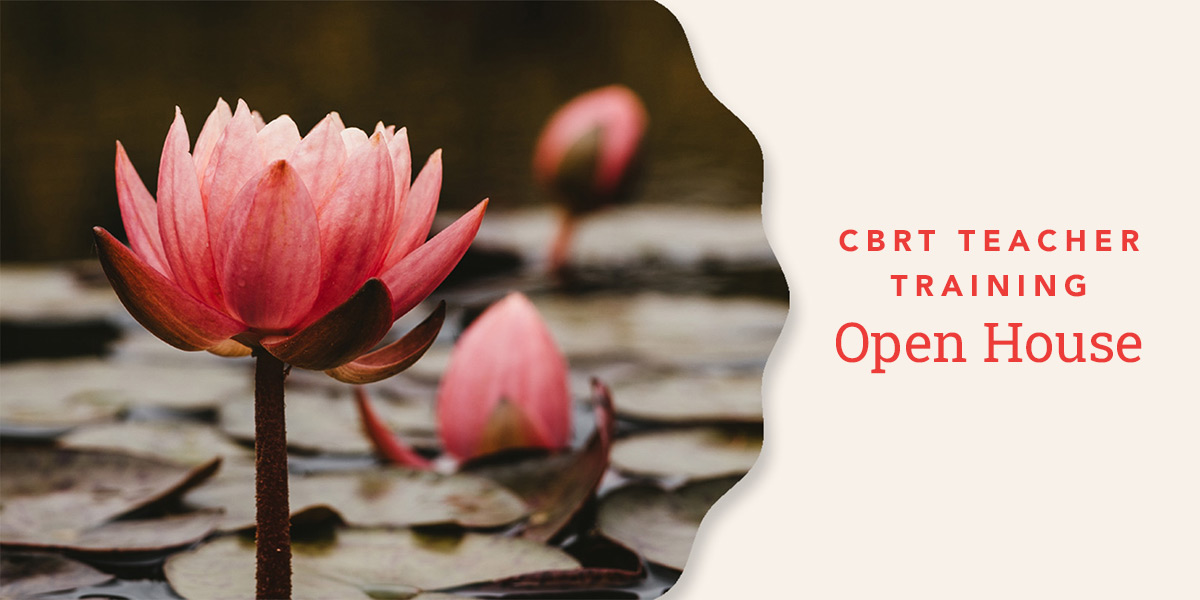
CBRT Teacher Training is an exciting opportunity to learn how to teach Compassion-Based Resilience Training (CBRT), an evidence-based program developed and field-tested over 20 years to support stress reduction, resilience and self-healing. If you’re curious to learn more about the training, check out this video—a recording from our Open House, where core faculty discussed the program and answered potential student’s questions.
CBRT has a unique, multifaceted approach that brings together mindfulness, compassion, contemplative healing, and embodied practices all into one program. Meditation and mindfulness are known to counteract emotional stress reactivity and worst-case thinking, while also supporting the development of positive emotions and an unbiased open mind. Research has also shown cross-training mindfulness with compassion practices actually increases its efficacy.
Furthermore, the CBRT approach is distinctive from other programs through its integration of embodied practices into its curriculum—which catalyzes the path to self-healing through its effect on the nervous system, including shifting the nervous system into bonding and play mode, calming the vagus nerve, supporting the brain’s higher social capacities, speeding the natural development of compassion, sending cues of safe connection from body to brain, and rewiring our stress-reactive autonomic system into a network of unshakable, blissful connectedness and well-being.
The CBRT Teacher Training cohorts are international and diverse, with participants coming from all over the globe and from a multitude of disciplines (including mental health, coaching, yoga, medicine, humanitarian aid, and community health). This dynamic and diverse community provides a supportive, motivating, and validating environment for connection and learning.
If you’re interested in learning how to integrate contemplative practice into your life and work and how to deliver Compassion-Based Resilience Training to groups both large and small, whether in healthcare, education, business, or community service settings—this program is for you! Join Nalanda Institute founder and creator of CBRT, Joe Loizzo, MD, PhD, meditation teacher and Contemplative Therapist Moustafa Abdelrahman, MBA, RP, and Nalanda Institute’s Director of CBRT, Fiona Brandon, MPS, MA, MFT, on this transformative journey starting soon!
Find out more about Nalanda Institute’s CBRT Teacher Training.
by Katherine Jamieson
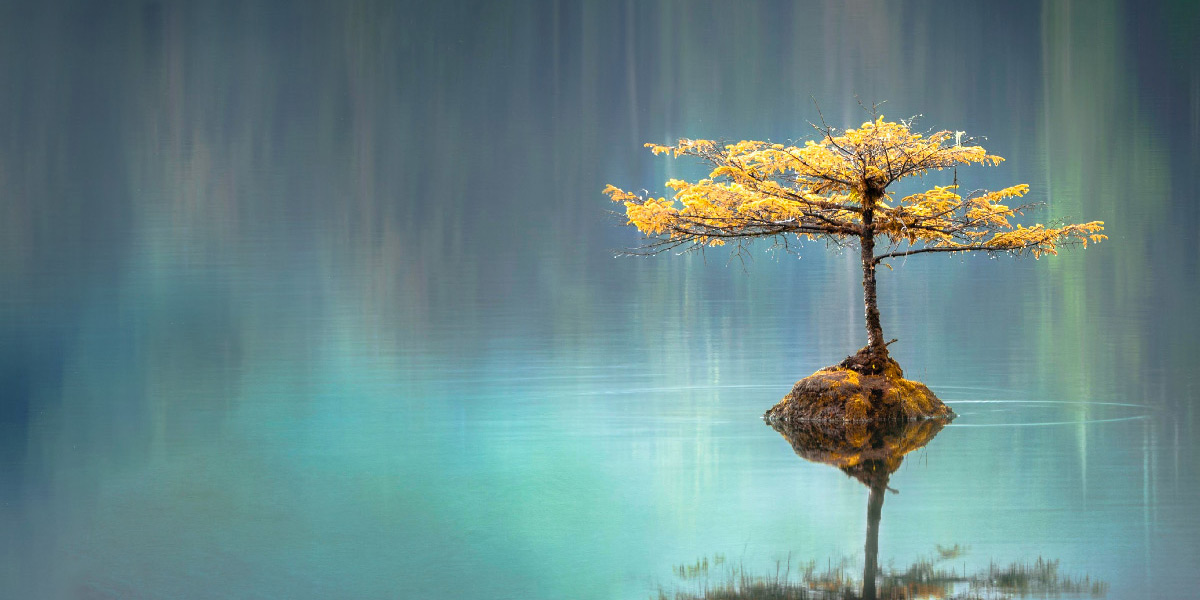
Editor’s Note: Katherine Jamieson will be leading a 3-session contemplative writing course, Contemplative Writing: Uncovering the Writer Within beginning May 7th. Find out more and register today.
I talk to a lot of people who want to be writers, but are struggling. Something is in the way. They think: What should I write about? Am I good enough to even be doing this? Who would want to read my work? They sit down to create and 10,000 distractions rise up: text messages, appointments, pressing errands. Soon they are doing something else, something urgent, which is actually a relief. Anything is easier than writing.
The act of writing is very simple: just put one word after another. But this simplicity is also anxiety-provoking. There is no hiding behind an instrument, tools or fancy technology. All you have is a pen or pencil, maybe a computer. Writing is a very exposed art. You are sharing your thoughts on the page, laying your mind bare for all to see. You are offering your view on what it means to be alive. What could be more amazing, or more terrifying?
Often when I sit down to write my mind is going in many directions at once. My thoughts and emotions are jumbled, loud, vying for attention. But if I can remember to breathe and feel my fingers on the smooth keyboard, my body in the chair, I can ease into what I am doing. Maybe I need to start slowly. For the next five minutes, I am writing. And then tomorrow: For the next twenty minutes… This is how we build muscle and cultivate our writing practice, our writing life.
Over time we can begin to tap into our natural stillness. If we allow this quiet to grow it will nourish us and give us the courage to push back against our self-judgment, hyper-criticism, and censoring mind. It will help us heighten our awareness and powers of observation. We may tap into long-forgotten memories and feelings, make sense of our past, vision our future, bring rough beauty into the world.
Fundamentally, we must learn to trust ourselves. In the words of John Daido Loori, former Abbott of Zen Mountain Monastery:
“If I was asked to get rid of the Zen aesthetic and just keep one quality necessary to create art, I would say it’s trust. When you learn to trust yourself implicitly, you no longer need to prove something through your art. You simply allow it to come out, to be as it is. This is when creating art becomes effortless. It happens just as you grow your hair. It grows.”
When we trust ourselves all the myriad writing struggles and doubts start to fade away. We see that our creative self is the same as our day-to-day self, not something special or separate. The rewards of writing begin to outweigh the risks, our fear recedes, and we see our vast potential, as wide and bright as the ocean on a full moon night. Effortlessness is the natural outgrowth of trusting ourselves, not just a pie-in-the-sky idea but a way of being in the world.
Most importantly, when we trust ourselves we’re able to be joyful as we create, regardless of the outcome. We know that we are worthy, and we can relax into this knowledge. Writing now brings us relief, not tension. As Loori says, we release ourselves from the idea of having to prove something through our art.
We write to write, just that.
This post originally appeared in Medium. Find out more about visiting faculty Katherine Jamieson (bio). See also katherinejamieson.com
Photo by Faye Cornish (unsplash.com)
by Nalanda Institute
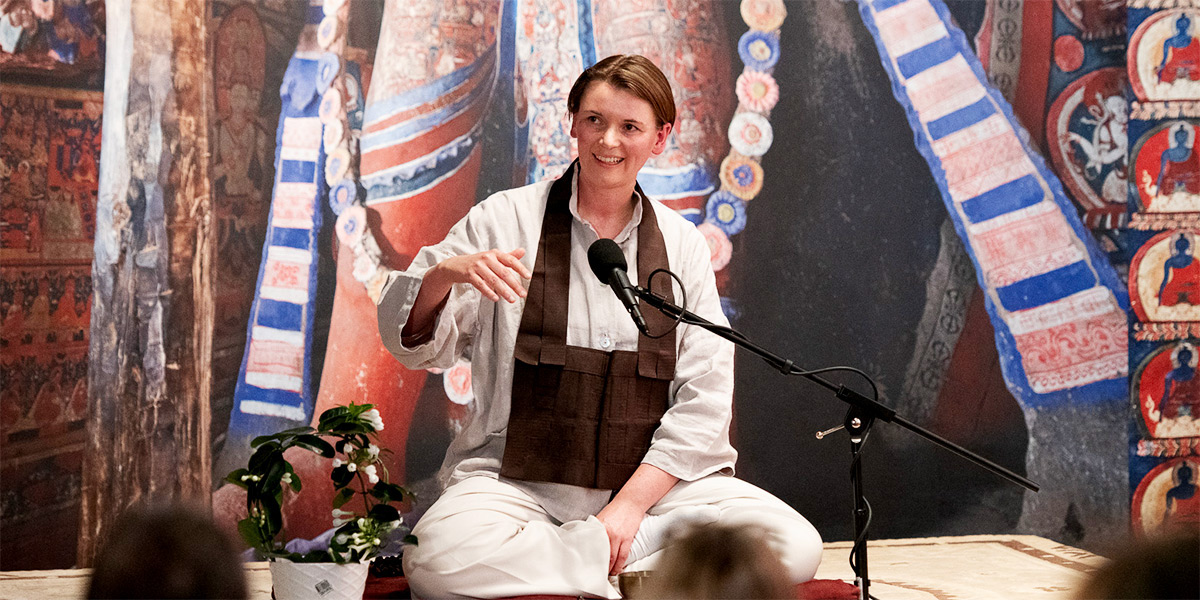
In January, Nalanda Institute, in collaboration with Wonderstruck, hosted Tatsudo Nicole Baden Roshi at Tibet House US, who gave a dharma talk and meditation on the foundational Buddhist principle of Śūnyatā, or emptiness.
According to Roshi, emptiness is one of the hardest concepts in Buddhism to get a real feeling for—because the way many of us perceive this word is conceptually vastly different from the phenomena it’s meant to represent within Buddhism. Roshi’s talk provides a framework and entry point to begin to unpack and explore the depth of the meaning of this Buddhist concept. She not only explains the philosophical meaning of emptiness—which is rooted in developing an awareness of the interconnected experience of our reality—but also discusses the experiential component of emptiness and how senses, awareness, and aliveness of our physical body are the entry points into being able to taste this profound and important teaching.
The video below is an edited version of the dharma talk Roshi delivered that night. We hope this offering supports your journey of touching into this transformative Buddhist principle of Śūnyatā.
by Geri Loizzo
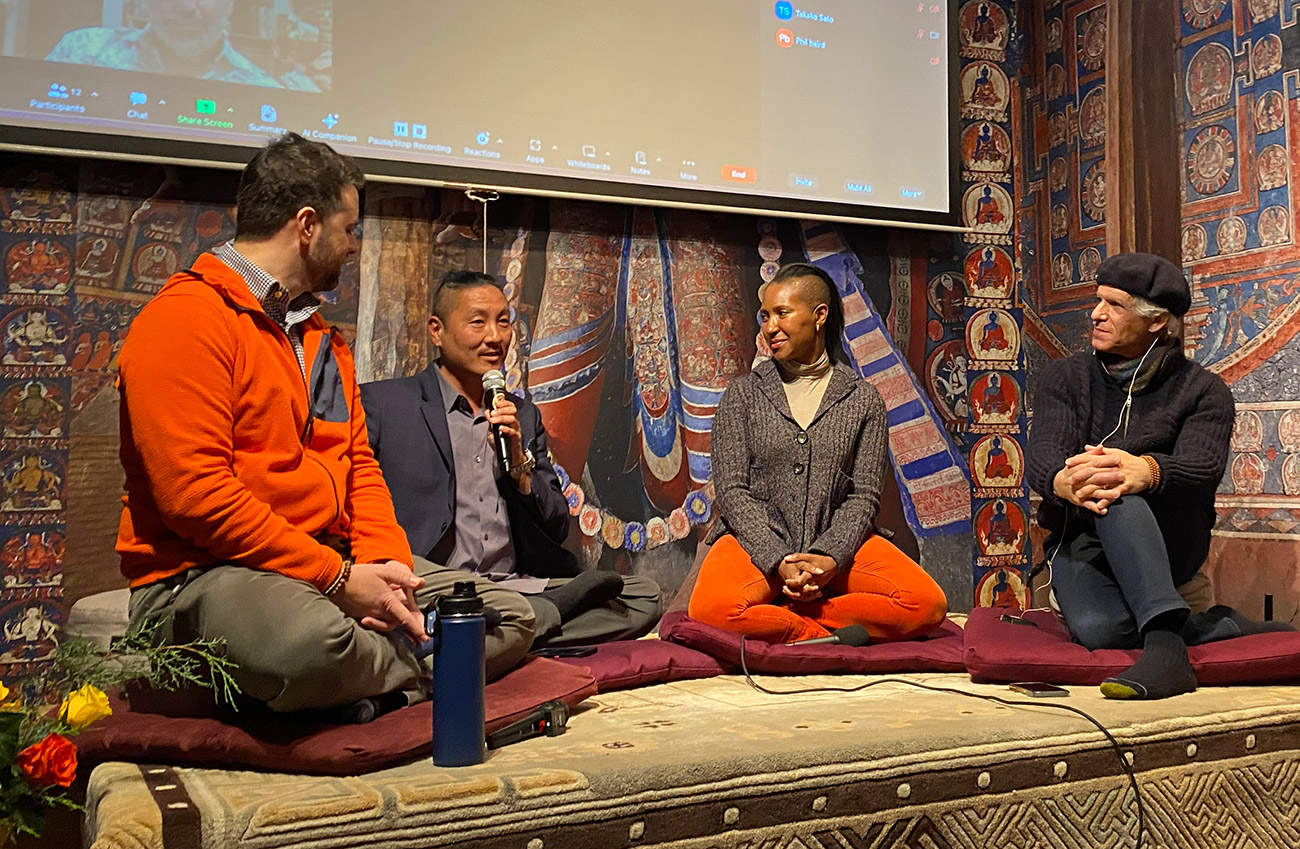
On the evening of the Solstice, as we approached the closing of 2023, the Nalanda community gathered to support our Year-End Drive and its theme, Awakening Our Shared Humanity. We are profoundly grateful to all of the participants and supporters at every level — the bodhisattvas, yogis, knowledge holders, daikinis, and world protectors!
Held in the beauty of the Tibet House temple art of Achi, amongst the sweet sounds of Bansuri flute by Sunder Das, and nourishing food and flowers — our panelists shared their rich experiences and vision on How Nalanda Institute Nurtures a More Humane Future.
Take a look and listen in to the vibrant panel discussion with author, contemplative healer, and yoga therapist Dr. James Bae, Nalanda Institute’s Director of Equity and Contemplative Psychotherapy Program Director, Rahshaana Green, and contemplative psychotherapist Dr. Michael Sosa. This insightful and vibrant panel discussion was moderated by Nalanda Institute’s founder and academic director, Dr. Joe Loizzo.
We hope that this offering will support you in making this wood dragon year, 2024, a year of wise compassion and shared humanity.
by Nalanda Institute
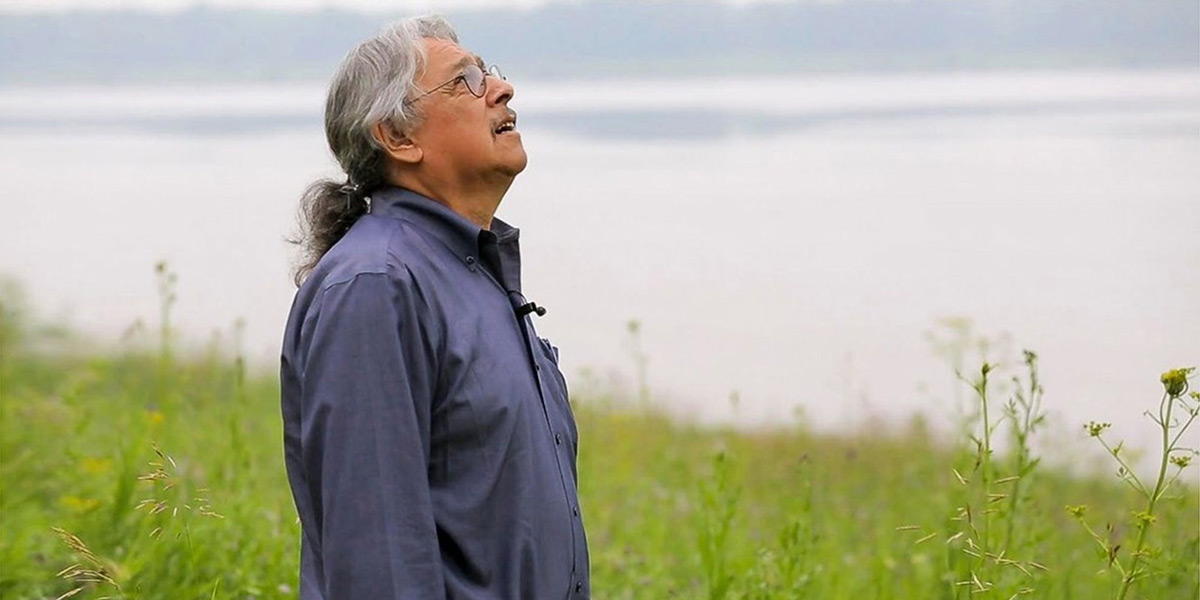
In honor of National Native American Heritage Month, we offer you this impactful teaching from the late Anishinaabe Elder Dr. Dave Courchene—our guest during our 11th online Offerings for Uncertain Times. Elder Courchene was an esteemed and internationally-known teacher, who shared his vision for the care of Mother Earth and all of her children—a vision resonant with the Tibetan Buddhist Kalachakra prophecy of the earth as a Medicine Planet. He founded the Turtle Lodge Centre of Excellence in Indigenous Education and Wellness in southern Manitoba as a gathering place to exchange intergenerational knowledge, revitalize language, train youth leaders, and find environmental solutions to climate change.
We hope this video provides inspiration and hope to see each other, Mother Earth, our friends and foes alike, as kin—spiritually connected to each other in this great web of life.
We are living in an unprecedented time. As humanity, we continue to struggle in finding our true identity.
After much reflection in witnessing what is happening in our world, it has become quite clear that humanity is suffering from the mindset of domination that originated from the idea that we can control and dominate nature.
The land is the foundation of life and must be treated with absolute respect. To do anything else, we harm not only the earth but ourselves. The role of our dilemma, which has created symptoms, such as climate change, violence, mental illness, and racism, is a severing of our relationship with our source of life, the earth.
When we lose touch with the earth, we lose our connection to our true spiritual identity and a true understanding of our uniqueness, our purpose of humanity, our original instructions in our duties and responsibilities.
When we go to the root, our solutions lie in reestablishing our sacred connection and relationship with the earth.
Our health and well-being as human beings is directly connected to the health and well-being of Mother Earth.
We have made the land sick. How we conduct ourselves in relationship to the land and to other members of creation directly affects the balance of life.
What we do to the land, we do to ourselves; the earth operates on the principle of balance. If we comply with these natural laws, we can restore the balance of our source of life.
— Elder Dr. Dave Courchene, “Envisioning the Medicine Planet”
by Ayesha Basi
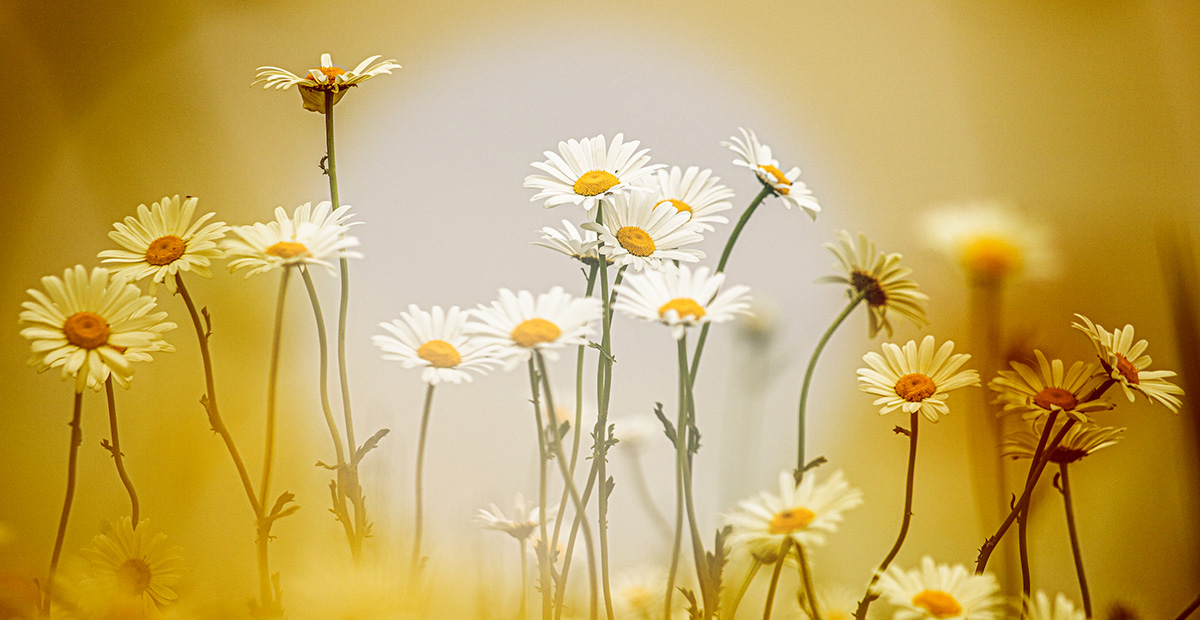
Last week, I participated in my first silent retreat led by the wonderful Kate Johnson. Not only was it my first retreat, but it was my first time spending five days in meditation focused solely on metta, the practice of lovingkindness. Metta is a practice of cultivating unconditional love, kindness, and positive energy towards oneself, others, and the world at large.
(more…)by Joe Loizzo
As you consider whether our program may be right for you, I thought it might help if I share some of the feedback I’ve heard over the years on what makes this program such a transformative journey for people seeking a deeper experience of the confluence of Buddhist contemplative psychology and contemporary life.
We offer a rare integration of rigorous academic learning, deep grounding in contemplative practice, and a learning community of open-hearted sharing led by a world-class faculty of scholar-teachers, scientific researchers, and pioneering clinicians who help make our journey together a truly life-changing experience. (more…)

